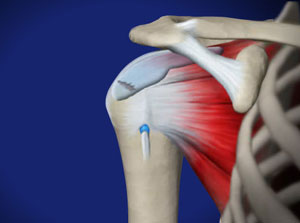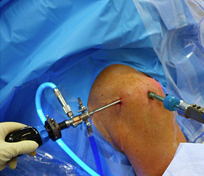Omaha Rotator Cuff Injuries Animation
Omaha Rotator Cuff Injuries
Learn about Rotator Cuff Injury from Dr. Keiser
 Rotator cuff injuries occur in the rotator cuff. This is a group of muscles and tendons that cover the head of the humerus and hold it in the shoulder socket. When rotator cuff tendons become damaged, the shoulder can become stiff, sore or lose mobility. Injuries are often caused by direct damage, such as a traumatic fall or repetitive overhead motions. It can also develop because of indirect causes such as impingement or shoulder imbalance.
Rotator cuff injuries occur in the rotator cuff. This is a group of muscles and tendons that cover the head of the humerus and hold it in the shoulder socket. When rotator cuff tendons become damaged, the shoulder can become stiff, sore or lose mobility. Injuries are often caused by direct damage, such as a traumatic fall or repetitive overhead motions. It can also develop because of indirect causes such as impingement or shoulder imbalance.
A rotator cuff tear is a common cause of pain and disability among adults. In 2013, almost 2 million people in the United States went to their doctors because of a rotator cuff problem. A torn rotator cuff will weaken your shoulder. This means that many daily activities, like combing your hair or getting dressed, may become painful and difficult to do.
Treatment of Rotator Cuff Injuries
Learn about Rotator Cuff Injury Surgery
Surgery to repair a torn rotator cuff most often involves re-attaching the tendon to the head of humerus (upper arm bone). A partial tear, however, may need only a trimming or smoothing procedure called a debridement. A complete tear is repaired by stitching the tendon back to its original site on the humerus.
There are a few options for repairing rotator cuff tears. Advancements in surgical techniques for rotator cuff repair include less invasive procedures. While each of the methods available has its own advantages and disadvantages, all have the same goal: getting the tendon to heal.
The type of repair performed depends on several factors, including your surgeon’s experience and familiarity with a particular procedure, the size of your tear, your anatomy, and the quality of the tendon tissue and bone.
Many surgical repairs can be done on an outpatient basis and do not require you to stay overnight in the hospital. Your orthopaedic surgeon will discuss with you the best procedure to meet your individual health needs.
You may have other shoulder problems in addition to a rotator cuff tear, such as biceps tendon tears, osteoarthritis, bone spurs, or other soft tissue tears. During the operation, your surgeon may be able to take care of these problems, as well.
Recovery of Rotator Cuff Injuries
Learn about Rotator Cuff Injury Surgery Recovery
 After surgery, you will feel pain. This is a natural part of the healing process. Your doctor and nurses will work to reduce your pain, which can help you recover from surgery faster.
After surgery, you will feel pain. This is a natural part of the healing process. Your doctor and nurses will work to reduce your pain, which can help you recover from surgery faster.
Medications are often prescribed for short-term pain relief after surgery. Many types of medicines are available to help manage pain, including opioids, non-steroidal anti-inflammatory drugs (NSAIDs), and local anesthetics. Your doctor may use a combination of these medications to improve pain relief, as well as minimize the need for opioids.
Be aware that although opioids help relieve pain after surgery, they are a narcotic and can be addictive. Opioid dependency and overdose has become a critical public health issue. It is important to use opioids only as directed by your doctor. As soon as your pain begins to improve, stop taking opioids. Talk to your doctor if your pain has not begun to improve within a few weeks after your surgery.
Rehabilitation plays a vital role in getting you back to your daily activities. A physical therapy program will help you regain shoulder strength and motion.
Immobilization. After surgery, therapy progresses in stages. At first, the repair needs to be protected while the tendon heals. To keep your arm from moving, you will most likely use a sling and avoid using your arm for the first 4 to 6 weeks. How long you require a sling depends upon the severity of your injury.
Click on shoulder conditions to learn more!
Omaha shoulder information provided by Dr. Darren Keiser
